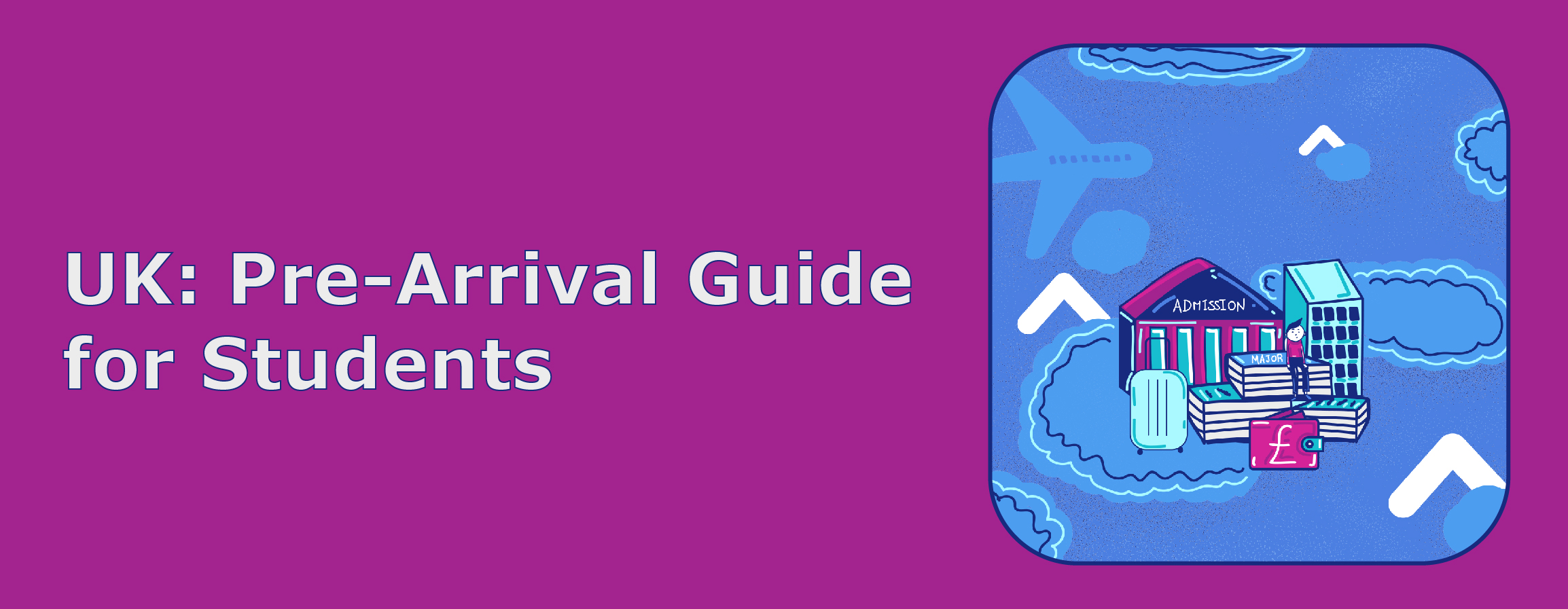UK: Pre-Arrival Guide for Students
Travel Preparation
5 mins read
Share

Updated at: 25 November, 2025
Published at: 21 June, 2021
By Hadeel Hossam
UK: Pre-Arrival Guide for Students
Travel Preparation
5 mins read

Updated at: 25 November, 2025
Published at: 21 June, 2021
By Hadeel Hossam
Share
So you’ve chosen the UK as your destination to study abroad, how exciting! It’s one of the top countries for international students with some of the best universities in the world. The decision to study abroad is a major one that requires a lot of planning to travel smoothly and safely to your destination. If you’re wondering what you should be doing before you travel to the UK, we’re here to help you out with a full pre-arrival guide.
1. Plan Your Budget
One of the first and most important things you should do before arriving in the UK is setting a budget. From university tuition and accommodation fees to food, transport, and books, you need to layout all your needs and research costs at your destination to put together a comprehensive budget plan. This will help you determine which cities you can afford as well as narrow down the universities you can apply to. Make sure you also research scholarship opportunities you can take advantage of to take off some of the financial burdens. For extra help, check out our 7 Savvy Ways to Live on a Budget as a Student and Money Management Tips for Students blogs.
2.Choose Your University Degree
Don’t let your excitement of starting a new journey abroad hinder your search for the perfect courses. You have to spend enough time thinking about possible course options that you’re interested in and have promising career prospects. Don’t worry, if you decide on something and end up changing your mind, there’s always the possibility of switching majors.If you’re torn between two subjects to major in, you should consider going for a Joint honours degree.
3. Apply to University
Now that you’ve picked your major and narrowed down your choices for possible universities, it’s time to start the application process. Almost all universities will have language requirements for international students so make sure your English is good before applying. Some universities require an IELTS certificate; you can check out our Tips to Prepare for IELTS blog to feel more confident about the IELTS test as it is a major requirement of most universities.
Additionally, If you’re applying for an undergraduate degree at a publicly-funded university, you need to go through the UK’s central admissions system; the University and Colleges Admission Service (UCAS). The website has detailed information regarding the application process for international students. There will be an application fee and you’ll get to submit an application online for up to five universities.
Make sure you have a personal statement prepared that you will be attaching with your application along with your personal information and education history. You will also be required to present your A-level exam results (or equivalent) as well as a couple of recommendation/reference letters Here are some Tips and Tricks for a Successful Personal Statement to help you out. If you don’t get into any of the universities you applied to, it’s not the end of the road since you can still apply to UCAS Clearing.
4. Prepare Your Student Visa
As an international student, you will need to apply for a UK student visa. To apply for a student visa, you’ll need to present proof of a place at a university which means waiting for your offer letter before applying. You’ll also need proof of language proficiency and proof of financial support. There are many types of student visas in the UK for both short and long term course lengths. You can only apply for your visa a maximum of three months prior to the start of your course. To find out more about the process, head over to our How to Get a Student Visa in The UK blog.
5. Book Your Student Accommodation
So you know where you’re studying, what you’re studying, and have your student visa approved and ready to go, what’s next is finding your new home away from home! Booking your student accommodation is one of the final steps before starting your new journey but needs just as much research as all the other steps. There are many types of student accommodation you need to be acquainted with to make an informed decision based on your living preferences. From PBSAs and on-campus accommodation, to co-living and shared housing, to homestay programs, each option has its pros and cons. The most important thing is to find a UK student accommodation that is within a short distance from campus and has all the facilities you might need like laundry, Wi-Fi, all-inclusive bills, and 24/7 security.
6. Pack Your Bags!
You are now all set and ready to start packing for studying abroad! To stay organized, make sure you prepare a travel itinerary that has a list of everything you need to pack, things you need to buy, and things you will get from your destination. Make sure you research the UK travel laws regarding items you can bring into the country. You can’t pack things like meds unless they are prescribed, as well as meat and fish products. You should also research the weather conditions in your destination city year-round to pack suitable clothes. Most UK cities are cold and rainy, so don’t forget your coats, sweaters, and rain boots. To keep it light, don’t pack anything that can be easily and cheaply purchased from your destination like toiletries, stationery, cooking utensils, towels, etc. Here are some Quick Tips To Organize Your Travel Bag to help you out!
7. Moving Day!
Wondering what to do on moving day? Well, you need to find out beforehand if your university or student accommodation offers an airport pickup service. That way you will be greeted by an official ambassador and guided to your new home, making navigating what’s in-between much easier. If this service isn’t offered, make sure you sort out means of transport between the airport and your accommodation that can take all your luggage. As soon as you arrive, don’t go running to buy things you think you need just yet. Take a breath, get to know your room and take a tour of the accommodation facilities and communal areas. Once you’re fully rested, you should start unpacking right away to avoid cramming your rooms with boxes and bags. Remember to unpack smartly, organizing everything as you take it out so as not to double the work later on. Learn more about moving day from our Moving Day Tips and Tricks for Students blog.
There you have it, this is your full pre-arrival guide to the UK to start this new adventure of receiving a high-quality education in one of the best countries for international students. It might be a long process, but once you set foot in your new home, it will all be worth it. Remember to thoroughly research through each step and communicate with university counsellors to know about any requirements or procedures you may not be aware of. With the right information and the correct documents, it’ll all go smoother than you thought.
Travel Preparation
By Hadeel Hossam
Share
Travel Preparation
Updated at:
Published at:
By Hadeel Hossam
Share


